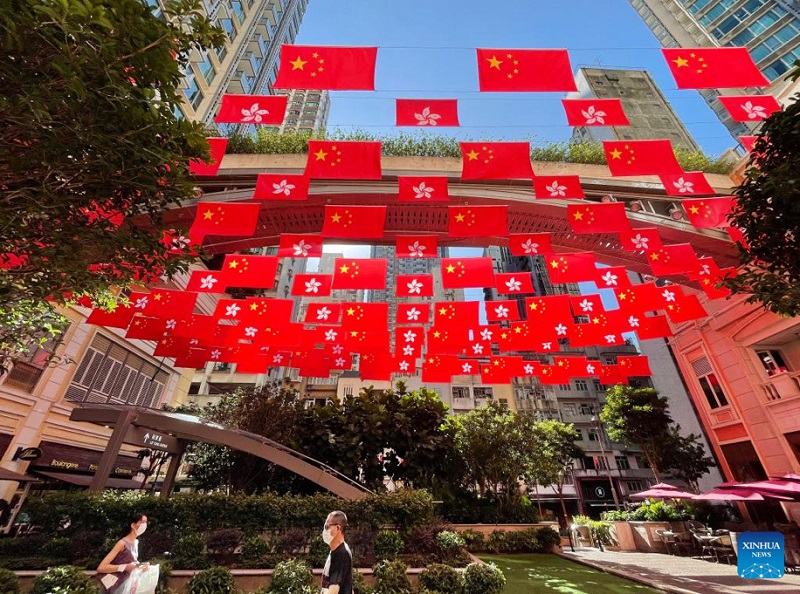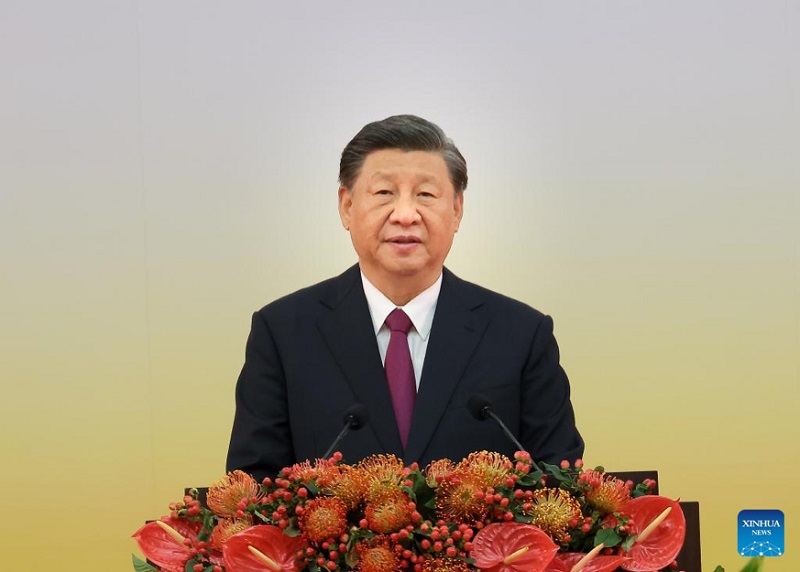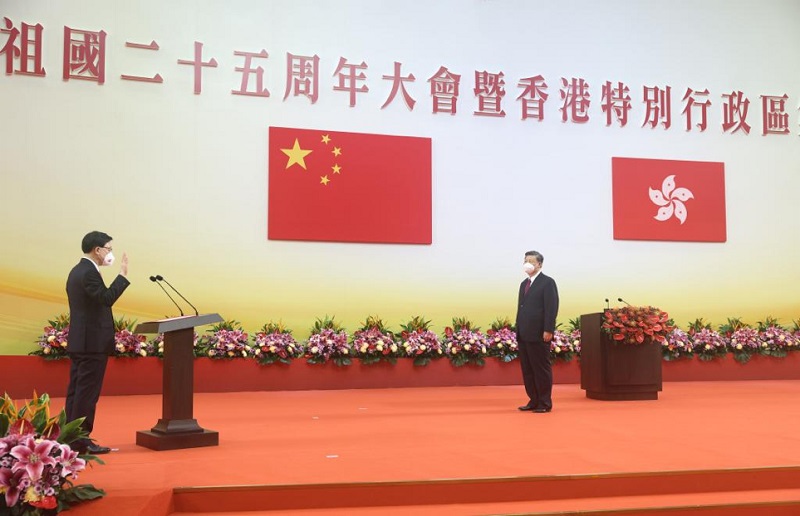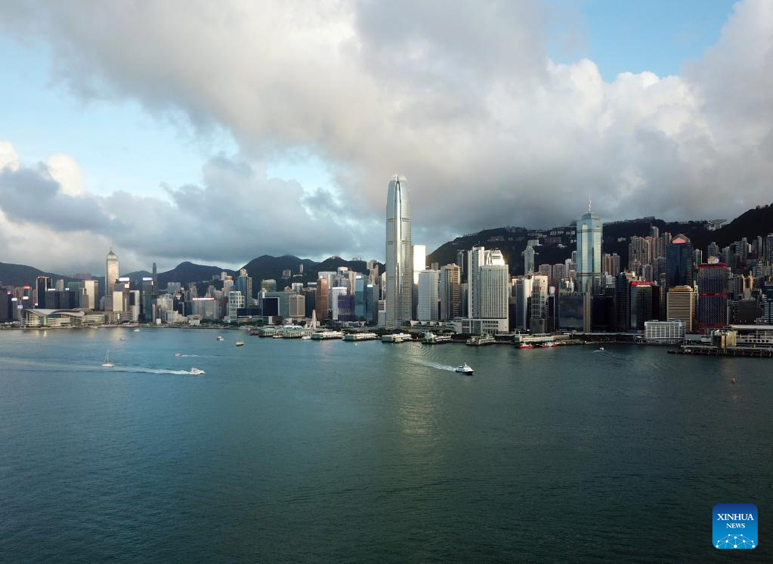With the arrival of July 1, the day marking the 25th anniversary of Hong Kong’s return to the motherland, festive joviality has pervaded every corner of the city. Dozens of open-top buses with celebration banners and decorations, and 250 taxis embellished in the same fashion, paraded through Kowloon and the New Territories on June 28. Songs extolling the city and the great motherland could be heard in many landmark sites. With a range of celebration activities staged around July 1, Chinese red celebrative decorations festooning the town, citizens showed their confidence in the special administrative region’s future and expressed their best wishes for Hong Kong and the motherland.

China's national flags and the Hong Kong Special Administrative Region flags fly along the Lee Tung Avenue in Hong Kong, south China, June 28, 2022. (Xinhua/Li Gang)
"Over the past five years, I have always been concerned about and caring for Hong Kong, and my heart and that of the central government are always with the Hong Kong compatriots," Chinese President Xi Jinping said in a speech delivered upon his arrival in the Hong Kong Special Administrative Region (HKSAR) on June 30.
During his two-day stay in Hong Kong, Xi, also general secretary of the Communist Party of China Central Committee and chairman of the Central Military Commission, attended the meeting celebrating the 25th anniversary of Hong Kong's return to the motherland and the inaugural ceremony of the sixth-term government of the HKSAR, and inspected the region.
Hong Kong People’s Well-being Prioritized
“Hong Kong should earnestly address people's concerns and difficulties in daily life,” Xi noted in his address delivered at the meeting celebrating the 25th anniversary of Hong Kong's return to the motherland on July 1. “As I once said, the people's aspiration for a better life is what we are striving for. Currently, the biggest aspiration of Hong Kong people is to lead a better life, in which they will have more decent housing, more opportunities for starting their own businesses, better education for their children, and better care in their twilight years,” he indicated.

Chinese President Xi Jinping attends a meeting celebrating the 25th anniversary of Hong Kong's return to the motherland and the inaugural ceremony of the sixth-term government of the Hong Kong Special Administrative Region and delivers an important speech, at the Hong Kong Convention and Exhibition Center in Hong Kong, south China, July 1, 2022. (Xinhua/Yao Dawei)
Since the city’s return to the motherland, people there have witnessed steady improvement of their living. Their average life expectancy in 2021 stood at 83.0 years for males and 87.7 years for females, the highest in the world, according to the World Bank. It was 76.8 years and 82.2 years, respectively, in 1997. Experts have pointed out that the long life expectancy in HKSAR is the result of improvements made in public health service, food availability and chronic disease treatment.
The mainland has played a very important role in ensuring the supply of daily necessities for people in Hong Kong. Data show that Chinese companies provide more than 90 percent of the supply of live pigs and cattle, 70 percent of fresh livestock and poultry, 78 percent of drinking water, 52 percent of wheat flour, and 42 percent of the oil and gas for Hong Kong.
In addition, over the past 25 years, the city’s cultural, recreational and sports facilities have increased steadily: the number of public libraries rose from 64 to 82, swimming pools from 32 to 44, stadiums from 74 to 102, football pitches from 291 to 317, and children's playgrounds from 596 to 665.
Nonetheless, some deep-rooted social problems, such as staggeringly high housing prices, the wide wealth gap, and few opportunities for upward mobility, have remained as major challenges in the city.
At the celebration meeting, Xi called on the newly inaugurated HKSAR government to “be pragmatic, live up to what the people expect of it, and consider the expectations of the whole society, particularly ordinary citizens, as what it should accomplish foremost.” The government should make sure that “all citizens in Hong Kong share more fully and fairly in the fruits of development so that every resident will be convinced that if you work hard, you can improve the life of your own and that of your family,” Xi emphasized.
In the past, filibusters by the opposition at the Legislative Council (LegCo) often thwarted the passing of the HKSAR government’s motions which would benefit the majority of Hong Kong residents and the SAR’s long-term development. With the enactment of the Law on Safeguarding National Security in Hong Kong and the improvement of the electoral system, the “patriots administering Hong Kong” principle has been ensured. "Actions taken by the central authorities ensured the LegCo's return to normal," said Andrew Leung Kwan-yuen, president of the LegCo, in an interview with Xinhua. According to Leung, legislation that can benefit Hong Kong's economy and improve local people's livelihood has since been passed efficiently. In the 2020-2021 legislative session, the LegCo passed a record 46 government bills, more than double the annual average of about 20 bills in previous legislative sessions.
“We must give special love and care to young people,” Xi noted in his speech. “We must help young people with their difficulties in studies, employment, entrepreneurship, and purchasing of housing, so that more opportunities will be created for their development and accomplishment,” he then stressed.
The integrated development of Guangdong-Hong Kong-Macao Greater Bay Area (GBA) has created new prospects for youths in Hong Kong. In early 2021, the HKSAR government announced a GBA youth employment program, under which enterprises with operations in Hong Kong and other GBA cities are welcome to join the scheme to offer job vacancies.
Data from Shenzhen's Human Resources and Social Security Bureau shows that by the end of 2021, more than 37,000 Hong Kong residents were participating in the employee pension schemes in Shenzhen, an increase of 204 percent from the end of 2018.

Chinese President Xi Jinping administers oath of office to the sixth-term Chief Executive of the Hong Kong Special Administrative Region John Lee at the Hong Kong Convention and Exhibition Center, south China's Hong Kong, July 1, 2022. (Xinhua/Ju Peng)
The newly inaugurated sixth-term HKSAR Chief Executive John Lee also promised in his political manifesto to formulate a comprehensive youth policy to aid their upward mobility. The initiatives cover vocational training, employment opportunities and start-up support for young entrepreneurs, also encouraging Hong Kong youths to seek employment and entrepreneurship opportunities in the mainland.
“One Country, Two Systems” – Guarantee of Hong Kong’s Prosperity
"One country, two systems" has been tested repeatedly in practice, Xi stressed in his speech. “It serves the fundamental interests of not only Hong Kong and Macao, but also the whole country and the nation,” Xi said, and then added, “There is no reason for us to change such a good policy, and we must adhere to it in the long run.”
Over the past 25 years, Hong Kong has secured impressive progress on multiple fronts, and emerged stronger as an international financial, shipping, and trade center. Hong Kong's economy swelled to HK $2.86 trillion in 2021, up from HK $1.37 trillion in 1997. During the same period, its total foreign trade in goods more than tripled to HK $10.27 trillion. Meanwhile, it has been rated as the world's freest economy and the fifth most competitive economy.
The practice of "one country, two systems" in Hong Kong is critical to the future of its financial sector, said Nicolas Aguzin, chief executive officer of the Hong Kong Exchanges and Clearing Limited (HKEX), in an interview with Xinhua.
"For years, Hong Kong has been a conduit between East and West, a vital global hub supported by its proximity to the mainland, deep talent pools, robust infrastructure, internationally-aligned regulatory regimes and practices, free flow of capital and transparent, open and globalized markets," he said.
Hong Kong, New York City and London are collectively known as "Nylonkong," an acronym of the top three financial centers in the world. The latest edition of the Global Financial Centers Index released by the British think tank Z/Yen Group and China Development Institute in Shenzhen, showed that Hong Kong maintained its third place in the overall ranking.
The market cap of Hong Kong's stock markets has risen from HK $3.2 trillion at the end of 1997 to HK $42.1 trillion at the end of 2021. Average daily turnover on HKEX's cash market reached HK $166.7 billion at the end of 2021, compared with HK $15 billion in 1997.

Aerial photo taken on May 29, 2022 shows a view of the Two International Finance Centre (IFC) in south China's Hong Kong. (Xinhua/Li Gang)
Development needs a stable social environment as well as institutional and legal guarantees. The enforcement of the Law on Safeguarding National Security in Hong Kong since June 2020 has further cemented the city's role as an international financial center. Meanwhile, the rule of law has been the cornerstone of the HKSAR's success. The Worldwide Governance Indicators by the World Bank shows that Hong Kong's rule of law percentile ranking has remained above 90 points since 2003, compared to only 69.85 points before Hong Kong's return to the motherland.
As a cosmopolis, Hong Kong's vitality has impressed the world, Xi acclaimed in his speech. He emphasized, “‘One country, two systems’ is an unprecedented innovation. Its fundamental purpose is to safeguard China's sovereignty, security, and development interests and to maintain long-term prosperity and stability in Hong Kong and Macao.”
Strong Support from the Motherland
“Hong Kong's close connection with the world market and strong support from the motherland are its distinctive advantages,” Xi pointed out in his speech.
"Being a relatively small economy with a population of just over seven million, Hong Kong would not have developed into the international financial center it is now without the strong backing of the mainland's continuous development," said Laura Cha Shih May-lung, chairperson of the HKEX, in an interview for the commemorative book recently published by the HKSAR government. Another interviewee, Sabrina Chao, president of the Baltic and International Maritime Council, called for "combining the mainland's manpower resources with the experience of Hong Kong ship owners for new measures that tie in with the development of the GBA and also for the benefit of the long-term development of the industry."
Victor Fung, chairman of the Fung Group, with a profound knowledge of Hong Kong's trade development, believes that closer collaboration with other cities in the GBA will enable Hong Kong to play a vital role as the global supply chain orchestrator. Fung thinks that Hong Kong should ride on its global networks, international trade experience and well-developed service industry. For example, Hong Kong's product standard is highly recognized, and it can provide testing and accreditation services for mainland manufacturers, creating a new collaboration model, transforming Hong Kong into the key connecting platform under the country's new development pattern of "dual circulation," he indicated.
At the same time, Hong Kong is also an important service platform for Chinese firms to go global. The proportion of mainland enterprises in Hong Kong stocks has risen rapidly since 1997. As of April 2022, 1,370 mainland enterprises are listed in Hong Kong, accounting for 53.3 percent of the total number of companies listed on the HKEX and 77.7 percent of the total market capitalization, with a market value of HK $37.6 trillion.
From 1997 to 2021, the value of trade between the SAR and the mainland increased 6.1 times from US $50.77 billion to US $360.33 billion, an average annual increase of 8.5 percent, according to the Chinese Ministry of Commerce.
The mainland is Hong Kong's largest export market and source of imports. Hong Kong has long been the mainland's largest source of inbound direct investment and offshore financing platform, and has also become the mainland's largest outbound direct investment destination.
In his speech, Xi indicated that the central government fully supports Hong Kong in its effort to seize historic opportunities offered by China's development and actively dovetail itself with the 14th Five-Year Plan (2021-25) and other national strategies.
From disarray to good governance, Hong Kong is entering a new phase of becoming more prosperous, Xi noted. The next five years are important for Hong Kong to break new ground and achieve another leap forward, he further pointed out.